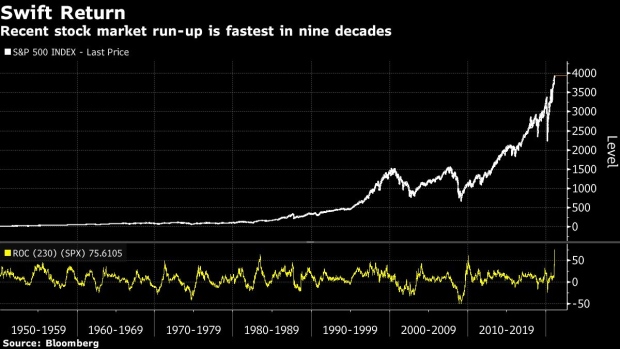Feb 20, 2021
Meme Stock Mania Alive and Well in Old Robinhood Restricted List
, Bloomberg News

(Bloomberg) -- A lot of sins are forgiven in a bull market. So while viewers of the GameStop Corp. congressional hearing were barraged with tales of newbie day traders getting clobbered for dabbling in the loopiest meme stocks, those wounds are healing fast.
It’s testament to how hard it is to keep anything down nowadays that stocks whose volatility briefly got too hot for Robinhood to handle have emerged a month later as winners. Ten of 50 companies put on the broker’s restricted list have surged more than 50% since the episode peaked, while the average stock caught up in the maelstrom is up 24%.
Nobody would argue that the stress caused when Robinhood cut off trading in the shares was good for its clients or sentiment in general. But nor should it be assumed that everyone trading the wildest of the meme-stock names paid a steep price for it.
“It still looks frothy in these types of stocks,” said Matt Miskin, co-chief investment strategist at John Hancock Investment Management. “These are the negative side effects of increasing liquidity at such an unprecedented pace.”
Exactly a year has passed since the the unraveling of the longest bull market in history. Thanks to the subsequent rebound, U.S. companies have added another $8 trillion in value. Along the way, a retail trading boom was born, SPACs flourished and option markets grew more active than ever before.
As a result, even thought the bull market is by some measures young, bubble warnings are everywhere. Alongside an extraordinarily supportive Federal Reserve, low interest rates and trillions of dollars worth of fiscal stimulus from the government, a favorite saying of 2020 -- that “stonks” only go up -- keeps ringing true.
The S&P 500 is up 75% over the past 230 trading sessions, the strongest such period in nine decades. Since the March 2020 bottom, only four stocks in the S&P 500 have fallen. About 30 have gained 200% or more. Step back, and almost everything is doing well in 2021, particularly pockets of the market targeted by individual speculators.
Take a portfolio compiled by Bloomberg of the 50 stocks Robinhood restricted trading on late last month -- not that anyone is likely trading all 50 at once, but as a proxy for some of the most recent popular retail favorites. Since Jan. 28, American depositary receipts of Chinese game operator The9 Ltd. have surged 410%, bringing the firm’s year-to-date return to 2,242%. SPAC Churchill Capital Corp. has jumped 137%, bringing its 2021 gains to 429%. Penny stock Zomedica Corp. -- last month touted by “Tiger King” star Carole Baskin -- has popped 139% since late January, and is now up 889% this year.
Of course, that isn’t to say there haven’t been deep losses. GameStop has plunged about 79% while AMC Entertainment Holdings Inc. -- another of the most high profile retail plays -- dropped 34%. But many of these stocks have continued to rise.
Six of them are up at least 90% since Jan. 28, countering the narrative that retail investors have been roundly whacked since GameStop’s demise. At this week’s House Financial Services Committee hearing on Capitol Hill, lawmakers grilled witnesses including Robinhood Markets Chief Executive Officer Vlad Tenev, Citadel CEO Ken Griffin, and Keith Gill, the trader known as “Roaring Kitty,” about what happened late last month. Representatives accused Robinhood of gamifying the stock market and failing to protect retail investors.
According to Shawn Snyder, head of investment strategy at Citi Personal Wealth Management, there’s still rampant speculation in the markets. And there is some truth to the notion that stocks always go up: S&P 500 returns have been positive above 70% of the time on an annual basis, he estimates.
“The notion that stocks go up is accurate, but that doesn’t mean it’s always accurate,” he said. “When you have a lot of liquidity in the market through monetary stimulus and then you tack on fiscal stimulus, you tend to get this speculative fervor.”
©2021 Bloomberg L.P.